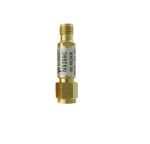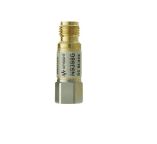DC Blocks
DC blocks are components that prevent the flow of audio and direct current (DC) frequencies while allowing the higher radio frequency (RF) signals to pass through. DC Blocks are placed within a system to stop any signal with a frequency of Zero Hz from interfering with sensitive RF components. The DC block acts like a filter only allowing the RF frequencies to pass through and are usually designed by placing capacitors in series with a transmission line.
There are three basic forms of DC blocks:
- Inner DC Blocks - the capacitor is placed in series with the centre conductor. They prevent the flow of DC and minimize the flow of low-frequency audio currents while providing minimum impedance to RF signals.
- Outer DC Blocks - the capacitor is placed in series with the outer conductor. They prevent the flow of direct current and low-frequency current surges along the outer conductors of transmission lines.
- Inner/Outer DC Blocks - the capacitor is placed in series with both the outer conductor and inner conductor. They prevent DC from passing along both conductors, typically in a coaxial connection.
The insulation material on the outer models is non-conductive.
Guide when looking for DC Blocks
- Frequency: DC blocks are usually optimized for a Frequency range i.e. they block all DC signals and allow RF signals in a specific frequency range.
- Voltage Rating: Also known as Breakdown Voltage or Max Voltage, this is the maximum voltage that a DC Block can handle before it breaks down. The higher the voltage rating the better.
- Insertion Loss: This is a measure of the loss of RF Signal that passes through the DC Block. In an ideal case this would be zero.
- Impedance: DC Blocks should be matched to the characteristic impedance of the system in which they are being used. Most RF systems are 50 ohms, however 75 ohm DC blocks are also available.
Applications include
- Ground loop elimination
- Signal source modulation leakage suppression
- System signal to noise ratio improvement
- Test setup isolation and other situations where undesired DC or audio current flows in the system
- Broadband coupling
- Blocking of current surges in subway and train tunnels.
2 Products showing for DC Blocks
Results per page

